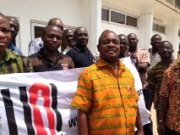News
UNI defends Ghanaian labour leader

UNI General Secretary Phillip Jennings has written to the Ghanaian Minister for Employment to ask him to intervene in the case of Comrade Ebenezer Mensah, the General Secretary of UNI affiliate, the Union of Private Security Personnel. Mensah has been wrongfully accused of forging trade union membership documents. Mensah vehemently denies any wrongdoing and sees it as desperate ploy by WESTEC to scare him away from union organizing following a bitter dispute over recognition and collective bargaining.
Despite USPS adhering to all the legal requirements of the Ghanaian Labour Act and WESTEC failing to provide any form of evidence, the court case is still going ahead. The Chief Labour Officer and the National Labour Commission were treating the USPS application as an ordinary case until Westec intervened. In Ghana, the process requires a verification process by the National Labour Commission to satisfy all sides that the signatures represent the will of the workers. Nevertheless, Westec did not deem this to be sufficient evidence, carrying out their own “verification process” and then reporting the forgery to the Police.
Furthermore, both the National Labour Commission and the Chief Labour Officer have called for the police to suspend the case, protesting that verification is how these matters are dealt with. However, the police and WESTEC have pressed on with these spurious criminal charges and Mensah is due in Court on the 4th September.
In the meantime, WESTEC have been summoned to the High Court where they were found in breach of the Directive issued by the National Labour Commission on this dispute and were fined 1,000 GHC. WESTEC continue to defy the Directive and have allegedly not paid the fine.
UNI affiliates have been asked to write to the Minister in support of Mensah and the UPSP, with General Secretary, Philip Jennings stating “We hope that in the spirit of reason, and with the correct application of the law, the National Labour Commission will be given the authority to resolve this dispute, to encourage voluntary agreement and to de-criminalise this industrial relations dispute through the use of agreed verification processes”.

